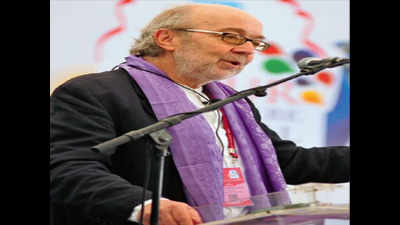- News
- City News
- jaipur News
- When you are in Rome, check out the pots
Trending
This story is from January 24, 2017
When you are in Rome, check out the pots
Bryan Ward-Perkins, who teaches history at Trinity College, Oxford, had actually brought samples of ancient Roman pottery for his session on ‘The fall of Rome and the end of Western civilization’ at the Jaipur Literature Festival (JLF) on Monday.

Bryan Ward-Perkins, who teaches history at Trinity College, Oxford, had actually brought samples of ancient Roman pottery for his session on ‘The fall of Rome and the end of Western civilization’ at the Jaipur Literature Festival (JLF) on Monday.
JAIPUR: Bryan Ward-Perkins, who teaches history at Trinity College, Oxford, had actually brought samples of ancient Roman pottery for his session on ‘The fall of Rome and the end of Western civilization’ at the Jaipur Literature Festival (JLF) on Monday.
His lecture had many in the audience spellbound. Not surprisingly, Ward-Perkins has history ‘in his blood’. His father John Bryan Ward-Perkins was a historian too. Showing a slide, he said that the area represented in it was excavated in the 1950s by a team led by his father.
On bringing pottery pieces for the session, he said, “I imagined the Mughal tent would be an intimate space and I could hand these pieces of pottery around so people could feel them.”
Addressing an audience of about 300 people, the historian showed how the Romans had built an elaborate civilization in the early years of the first millennium AD.
Showing a slide from Pompeii, he said that the city had even a sophisticated system of piped water supply – something that many in India still lack.
What was remarkable about the Roman civilization, the historian pointed out, was that even though there was poverty and slavery, there was evident concern for the comfort of all people – not just the rich and the elite. Also, the empire was so vast, and the elite a very diverse bunch. “It was almost like imagining Queen Victoria spending all her time in Africa or Asia, and only occasionally visiting London for ceremonial purposes,” he said. The Romans had absorbed people from across a vast area into their empire. “They were something like a modern nation,” he said.
Ward-Perkins, however, pointed out that the very sophistication of the system that the Romans had put in place also made them vulnerable. They were unable to keep in check people they termed ‘barbarians’ – the Germanic tribes. The Romans were also riven by civil war. By about the 5th century, the edifice that the Romans erected had gone. “What is important to see,” the historian said, “is that civilizations do die.”
Effusive in his praise for JLF, he said, “I have heard more interesting lectures and had several more interesting conversations in the past three days than I would in a year.”
His lecture had many in the audience spellbound. Not surprisingly, Ward-Perkins has history ‘in his blood’. His father John Bryan Ward-Perkins was a historian too. Showing a slide, he said that the area represented in it was excavated in the 1950s by a team led by his father.
On bringing pottery pieces for the session, he said, “I imagined the Mughal tent would be an intimate space and I could hand these pieces of pottery around so people could feel them.”
Addressing an audience of about 300 people, the historian showed how the Romans had built an elaborate civilization in the early years of the first millennium AD.
Sophisticated technology was used to manufacture pots – remains of these are still available, in vast quantities. The sheer quantity showed that these were widely distributed and that a system was in place both for manufacturing and distribution. There were even pits, where inferior quality pots were destroyed, so that they don’t find their way back to the market.
Showing a slide from Pompeii, he said that the city had even a sophisticated system of piped water supply – something that many in India still lack.
What was remarkable about the Roman civilization, the historian pointed out, was that even though there was poverty and slavery, there was evident concern for the comfort of all people – not just the rich and the elite. Also, the empire was so vast, and the elite a very diverse bunch. “It was almost like imagining Queen Victoria spending all her time in Africa or Asia, and only occasionally visiting London for ceremonial purposes,” he said. The Romans had absorbed people from across a vast area into their empire. “They were something like a modern nation,” he said.
Ward-Perkins, however, pointed out that the very sophistication of the system that the Romans had put in place also made them vulnerable. They were unable to keep in check people they termed ‘barbarians’ – the Germanic tribes. The Romans were also riven by civil war. By about the 5th century, the edifice that the Romans erected had gone. “What is important to see,” the historian said, “is that civilizations do die.”
Effusive in his praise for JLF, he said, “I have heard more interesting lectures and had several more interesting conversations in the past three days than I would in a year.”
End of Article
FOLLOW US ON SOCIAL MEDIA










